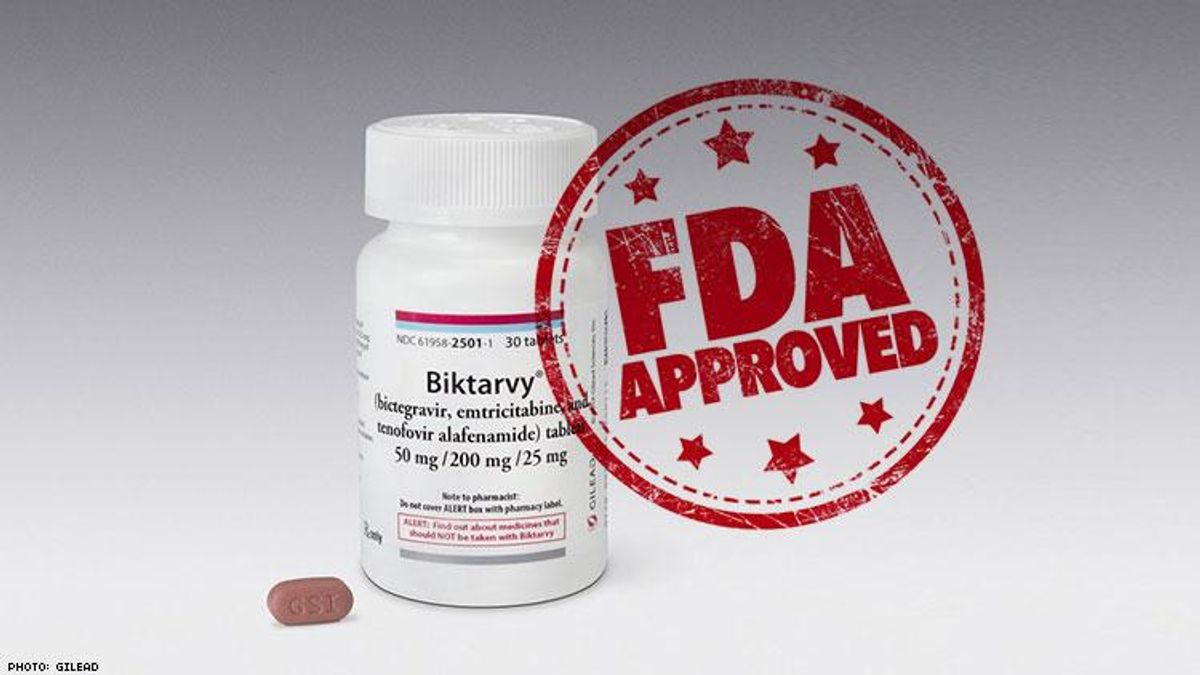Treatment
FDA Approves Once-Daily Triple-Combo HIV Drug

A new drug has been approved for HIV-positive people, and this one might be more practical.
February 09 2018 3:00 PM EST
By continuing to use our site, you agree to our Privacy Policy and Terms of Use.

A new drug has been approved for HIV-positive people, and this one might be more practical.
The U.S. Food and Drug Administration has approved a once-daily, three-combination drug, Biktarvy, making it the smallest INSTI-based triple-therapy STR available, according to Gilead.
Biktarvy combines the novel, unboosted integrase strand transfer inhibitor (INSTI) bictegravir, with the demonstrated safety and efficacy profile of the Descovy (FTC/TAF) dual nucleoside reverse transcriptase inhibitor (NRTI) backbone.
The drug is indicated as a complete regimen for HIV treatment in adults who have no antiretroviral treatment history—or to replace the current antiretroviral regimen in those who are undetectable and on a stable antiretroviral regimen for at least three months with no history of treatment failure and no known substitutions associated with resistance to the individual components of Biktarvy.
No dosage adjustment of Biktarvy is required in patients with estimated creatinine clearance greater than or equal to 30 mL per minute.
Biktarvy does not require testing for HLA-B*5701, has no food intake requirements, and has no baseline viral load or CD4 count restrictions.
According to Biktarvy’s Prescribing Information, prior to or when initiating treatment with Biktarvy, healthcare providers should test for hepatitis B and renal function, and monitor renal function as clinically appropriate during therapy.
Biktarvy has a "boxed warning" in its product label regarding the risk of post treatment acute exacerbation of hepatitis B.
“In clinical trials through 48 weeks, no patients taking the regimen of bictegravir plus FTC/TAF developed treatment-emergent resistance, results that were observed both in people new to therapy and those who were virologically suppressed and chose to switch regimens,” said Paul Sax, MD, Clinical Director of the Division of Infectious Diseases at Brigham and Women’s Hospital, Boston, Professor of Medicine at Harvard Medical School and a lead clinical trial investigator. "In addition, the clinical data show that the regimen’s antiviral efficacy, tolerability profile, and limited drug interactions offer an effective new treatment option for a range of people living with HIV.”
The approval of Biktarvy is supported by data from four ongoing Phase 3 studies. These trials were comprised of a diverse population of 2,415 participants, including a wide range of adult age groups and races/ethnicities.
During 48 weeks of study, no participants in any of the four studies failed Biktarvy with treatment-emergent virologic resistance, no patients discontinued Biktarvy due to renal adverse events and there were no cases of proximal renal tubulopathy or Fanconi syndrome. The most common adverse reactions in patients taking Biktarvy were diarrhea, nausea and headache.
“Gilead is committed to improving care and simplifying therapy for people living with HIV. We continue to invest in research in next-generation treatments, including therapies that could potentially cure HIV patients,” said John F. Milligan, PhD, Gilead’s President and Chief Executive Officer. “We are pleased to offer Biktarvy, our latest triple-therapy treatment, which brings together the potency of an integrase inhibitor with the most-prescribed dual-NRTI backbone in a once-daily single tablet regimen.”
Additional clinical trials of Biktarvy are ongoing, including a dedicated study in women, as well as a study in adolescents and children living with HIV.
Gilead plans to present data from these studies at scientific conferences in 2018.